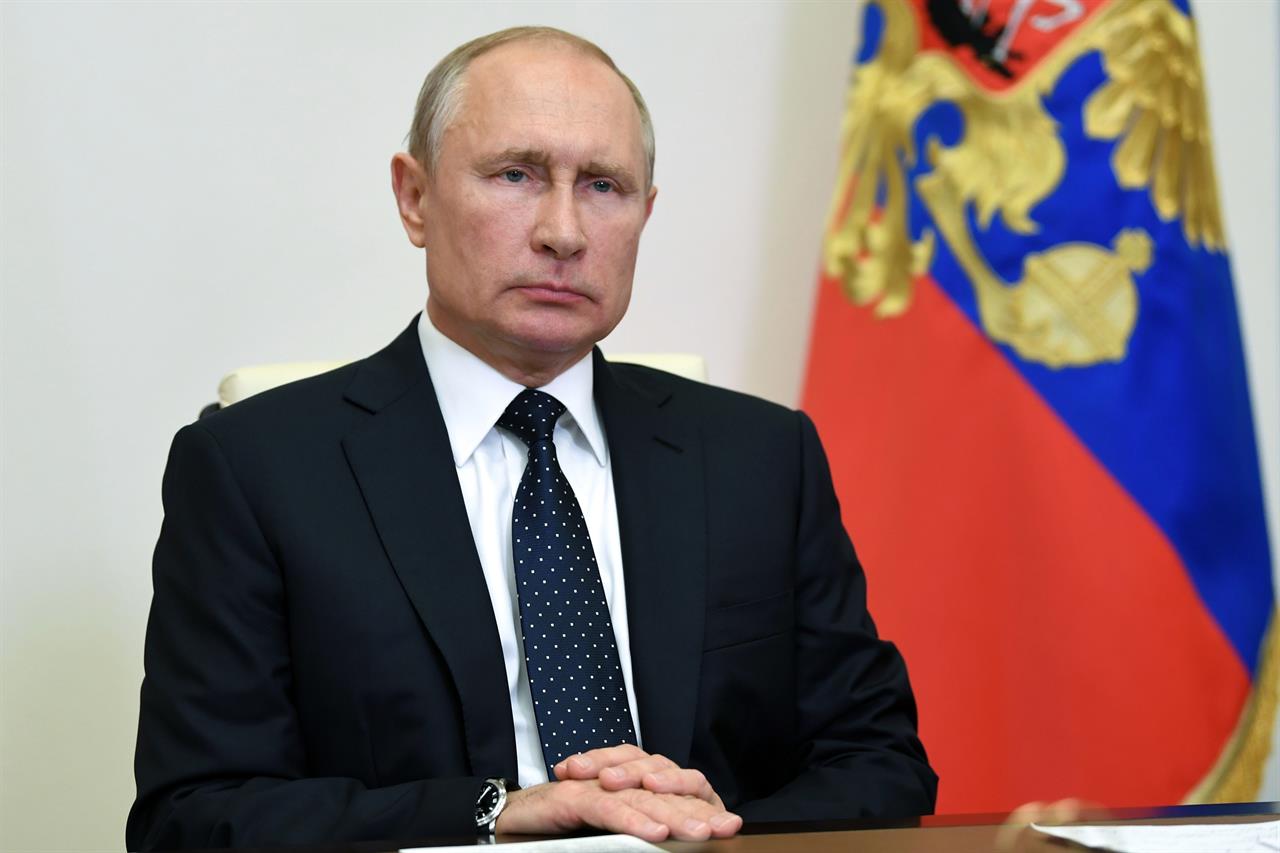Armenia's hopes of Russia joining its battle against Azerbaijan vanished after Russian President Vladimir Putin made it clear that Moscow would not intervene or offer Yerevan military support as the ongoing clashes are not within Armenian territory.
In an interview with the Russian public broadcaster Russia 24, President Putin reaffirmed Russia's commitment within the Collective Security Treaty Organization, or CSTO, which envisages that an attack on one member state is considered an attack on all others, and each is obliged to support their fellow members.
However, President Putin said that the military conflict was not taking place in Armenian territory.
"The fighting, which to our great regret, continues to this day. It is not taking place in the territory of Armenia," Lenta.ru quoted President Putin as saying on Wednesday, addressing the matter.
Since the fierce fighting broke out along the front zone in the occupied Nagorno-Karabakh region, an internationally recognized territory of Azerbaijan, the Armenian prime minister called Russian President Vladimir Putin five times over the last few days hoping for assistance. Russian support and military guarantees are critical to Armenia, which hosts a Russian military base near its second-largest city.
Earlier, in an interview with Al-Jazeera, Pashinyan voiced his hopes of bringing Russian peacekeepers to the Nagorno-Karabakh region. This prospect was addressed later by the Kremlin spokesman Dmitry Peskov who explained that sending peacekeepers to the zone of the Karabakh conflict is only possible with the authorization from both parties to the conflict - Armenia and Azerbaijan.
Not only officials but also businessmen of Armenian origin have been making unsuccessful attempts to drag Russia into the ongoing heavy clashes over the occupied Nagorno-Karabakh region of Azerbaijan. In response to recent messages of founder of Troika Dialog Ruben Vardanyan and billionaire Samvel Karapetyan, who called on Putin to interfere in the Nagorno-Karabakh conflict, Peskov clarified Moscow's position on the matter, which envisages concentration on restoring ceasefire in the region but not meddling in it.
"Putin has obviously been reported on all the messages. The emotional background is understandable," he said, according to RBK, stressing that Russia’s efforts are currently focused on the establishment of ceasefire in the region and resumption of negotiations.
Armenia is an ally of Russia and protected by it within the framework of the Collective Security Treaty Organization (CSTO). Some experts believe Armenia is set to expand military activities to the territory of Armenia, so it can demand Russia's military involvement.
For this purpose, Armenian armed forces deployed in both occupied Azerbaijani lands and Armenia itself have shelled densely populated areas and strategically important civilian infrastructure in Azerbaijan, which is considered as an act of terrorism against the civilian population.
Over the past eleven days of intense fighting, Armenia's forces launched intensive missile attacks against Azerbaijan’s second-largest city of Ganja, the central Azerbaijani city of Mingachevir, which hosts the country's largest hydroelectric power and water reservoir, Barda, Tartar and Beylagan. They also hit the Khizi-Absheron region near Azerbaijan’s capital Baku with mid-range missiles. A total of 31 civilians in Azerbaijan have been killed as a result of shelling of residential settlements by Armenian forces since September 27, while 154 people have been injured, according to the press service of the Prosecutor General's Office. Furthermore, 133 civilian facilities and 928 houses have been seriously damaged.
On October 6, Armenian forces targeted the Baku-Tbilisi-Ceyhan (BTC) oil export pipeline with a prohibited cluster rocket. The air defense units of Azerbaijan neutralized the missile before it reached the strategically important energy infrastructure, which transports crude oil from Azerbaijan to the markets in Europe.
The current clashes between Armenian and Azerbaijani forces along the Line of Contact in the occupied Azerbaijani lands erupted after Armenia's forces deployed in the occupied lands started shelling the military positions and civilian settlements of Azerbaijan on September 27. Azerbaijani troops took immediate counter-attack measures to push back against Armenia’s artillery offensive. So far, Azerbaijan's armed forces have liberated the city of Jabrayil and up to twenty villages in the districts of Jabrayil, Fuzuli and Tartar from Armenia’s occupation during the counter-attack campaign.
Armenia and Azerbaijan have been locked in a decades-old conflict over the Nagorno-Karabakh region, which is the internationally recognized part of Azerbaijan but occupied by Armenia. Following the Soviet Union’s dissolution in 1991, Armenia launched a military campaign against Azerbaijan. By the time a ceasefire was reached in 1994, Armenia had illegally occupied 20 percent of Azerbaijan’s internationally-recognized territories including the Nagorno-Karabakh region and seven surrounding districts. One million ethnic Azerbaijanis were forcibly displaced from these areas and 30,000 were killed.
Despite four UN resolutions demanding the immediate withdrawal of Armenian forces from occupied lands and the return of internally-displaced Azerbaijanis to their native land, Armenia has repeatedly refused to pull its forces out of the occupied territories.







 Iran's senior military leaders described the drone and missile attack on Israel on April 14 night as “successful".
Iran's senior military leaders described the drone and missile attack on Israel on April 14 night as “successful".
 The number of evacuees from flooded areas in Kazakhstan has reached 97,852 people, including about 32,856 children since March 27.
The number of evacuees from flooded areas in Kazakhstan has reached 97,852 people, including about 32,856 children since March 27.
 Iranian President Ebrahim Raisi warned Israel that it would face a "real and extensive" response if it makes any "mistake" following Tehran’s missi...
Iranian President Ebrahim Raisi warned Israel that it would face a "real and extensive" response if it makes any "mistake" following Tehran’s missi...



